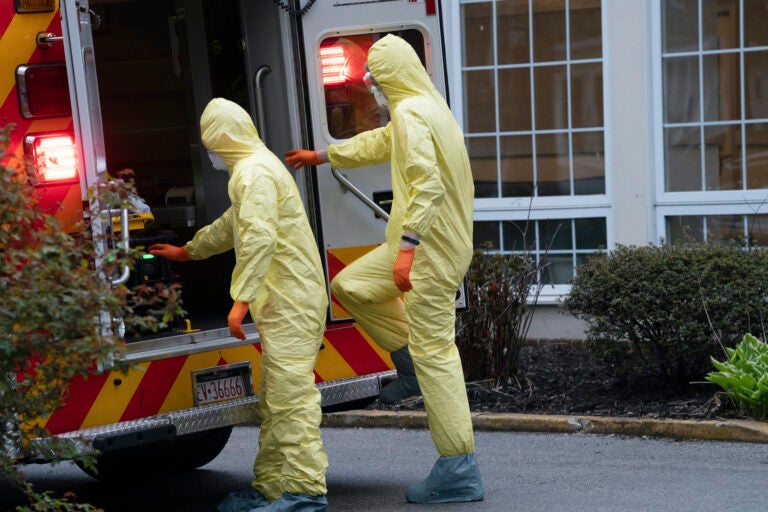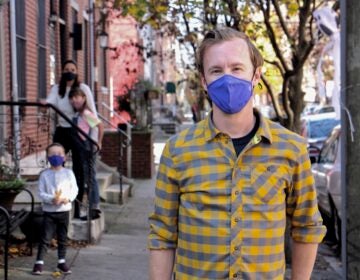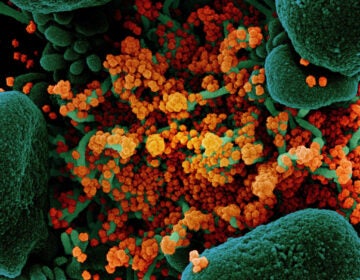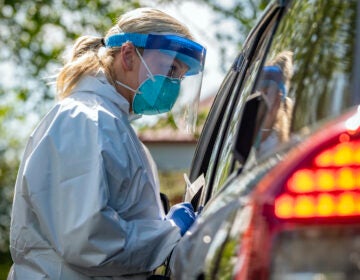Pa. coronavirus recovery: State on track to test all long-term care facilities by September
Philly’s contact tracing efforts indicate the virus is primarily spreading among household and family members, and even small gatherings or travel with friends.

Narberth Ambulance Paramedic Andrew Schifferli, left, and EMT Eric McKeever, right, wear full PPE during a call at a nursing home in Wynnewood, PA, on April 17, 2020, in Ardmore, Pa. (Jessica Griffin/Philadelphia Inquirer)
Updated 5:02 p.m.
Are you on the front lines of the coronavirus? Help us report on the pandemic.
On Tuesday, the Pennsylvania Department of Health reported 561 additional positive cases of COVID-19, bringing the statewide total to 130,035. The state reports a total of 7,605 deaths from the virus, an increase of 26 new deaths.
The number of statewide tests administered within the last 7 days is 157,763, with 4,630 positive cases over the past week.
Philadelphia on Tuesday reported 85 new confirmed cases of COVID-19 for a total of 33,139. The average is 98 cases per day, the lowest recorded so far since the peak of the pandemic. The city reported no new fatalities, with the current death toll standing at 1,736 people.
Philadelphia reports spread primarily among family and friends
Across the nation, school plans, large parties, and other congregate settings have served to spread the coronavirus. But contact tracing efforts indicate that in Philadelphia, the virus is primarily spreading among household members, family members, and even small gatherings or travel with friends.
“The lesson is that the people you trust the most are the ones that you’re most likely to catch the infection from — those are the ones that you’re around, those are the ones you get close to, and those are the ones that typically people don’t wear masks with,” Health Commissioner Tom Farley said. “You should trust those people, your relatives, and close friends, in general, but not with COVID.”
Some private agencies have announced they’re rolling out a 15-minute COVID-19 rapid antigen test, but Farley isn’t convinced of those tests’ efficacy.
“I’m still worried about false negatives,” Farley said Tuesday. “If you have some reason to think that you’re moderately high risk and you have a negative result, you better make sure you get a regular test [too]… you don’t want to assume that you’re negative and be positive, and then pass the infection onto other people as a result of that.”
That’s more feasible as standard testing delays, which were a problem earlier this month, begin to resolve. The city is averaging a test load of 2,860 per day, and residents can expect results back in about 1.3 days, according to Farley, with the exception of Quest Diagnostics’ laboratory results, which turn over in 4.2 days.
Pa. on track to test all long-term care facility residents by Sept.
Two months after Pennsylvania Health Secretary Dr. Rachel Levine signed an expanded testing order directing long-term care facilities to complete universal testing by the end of August, the state reports 85% of them have done so.
The order is directed at personal care homes, assisted living residences and private intermediate care facilities, which were required to test all residents and staff at least once by Aug. 31 — based on a similar directive to nursing facilities to complete universal testing by July 24.
So far, 1,160 facilities have completed universal baseline testing ahead of the August deadline. Department of Human Services Secretary Teresa Miller says the rest are on track to finish, with help from the Regional Response Health Collaborative program.
Nearly 47,000 Pennsylvanians live in long-term care facilities, and the combination of age and medical conditions makes them much more likely to experience COVID-19-related complications. The virus has hit smaller nursing homes the hardest; in the pandemic’s early peak, eight facilities in Delaware, Bucks and Montgomery counties lost more than a quarter of their entire resident populations.
Wolf wants to legalize weed to pay for COVID-19 help
Gov. Tom Wolf announced his legislative agenda for the fall. It includes hazard pay for frontline workers, family support via childcare and utility help, small business assistance, and a surprising addition: the legalization of recreational marijuana.
The governor projects legalization would generate nearly a billion dollars in additional state tax revenue, which he plans to use for COVID-19 relief.
“We all have a billion dollars of CARES Act funding being held in reserve,” Wolf said Tuesday morning. “With that, and the extra funding from marijuana legalization … we can actually help families that have been so devastated by this pandemic.”
State Health Secretary Dr. Rachel Levine said Tuesday at a separate press conference that the medical marijuana program has been fully implemented statewide, meaning that many policies are in place to move forward with recreational approval.
She enumerated the legalization of adult-use of recreational marijuana as an economic benefit, as well as from a social justice, incarceration-related perspective.
“As the governor said, now is the time,” she said.
Pa. launches mobile testing unit
Pennsylvania’s Health Department has unveiled its first mobile COVID-19 testing unit.
At 40 feet long, 14 feet tall and 10 feet wide, the unit is designed to provide affordable access to testing for low-income families in 16 counties across the state.
In the next few months, it’ll travel around the region, providing COVID-19 education and conducting tests on-site at various locations in Berks, Bucks, Delaware, Montgomery, and Philadelphia counties, among others.
Called CATE — which stands for Community-Accessible Testing and Education — the unit is managed in partnership with Latino Connection, Highmark Blue Shield and the Independence Blue Cross Foundation. It’s capable of testing 220 to 250 people per day, according to Latino Connection’s George Fernandez, and is staffed by about 30 “team members” from the partner organizations, most of whom are certified community health workers with experience in mobile unit outreach.
Health officials say it’s one more way to make testing more accessible to populations made vulnerable by financial risk, housing instability, and racial inequity.
“Economic opportunity is a social determinant of health … Education is a health issue. Transportation is a health issue, housing is a health issue, of course nutrition and the environment are all health issues,” Secretary Levine said Tuesday. “COVID-19 has kind of stripped bare what we already knew about health disparities, and this is just one way that the Pennsylvania Department of Health and the Wolf administration are addressing these very important issues.”

Get daily updates from WHYY News!
WHYY is your source for fact-based, in-depth journalism and information. As a nonprofit organization, we rely on financial support from readers like you. Please give today.



![CoronavirusPandemic_1024x512[1]](https://whyy.org/wp-content/uploads/2020/03/CoronavirusPandemic_1024x5121-300x150.jpg)



